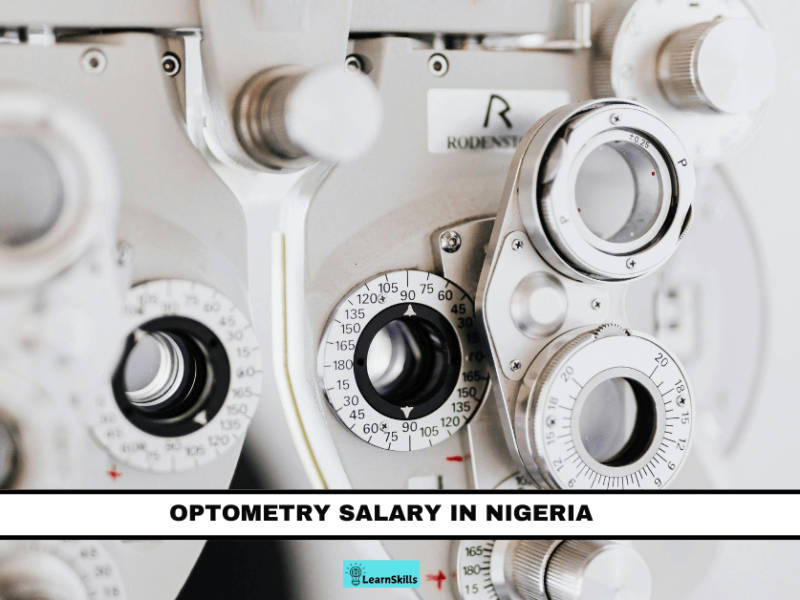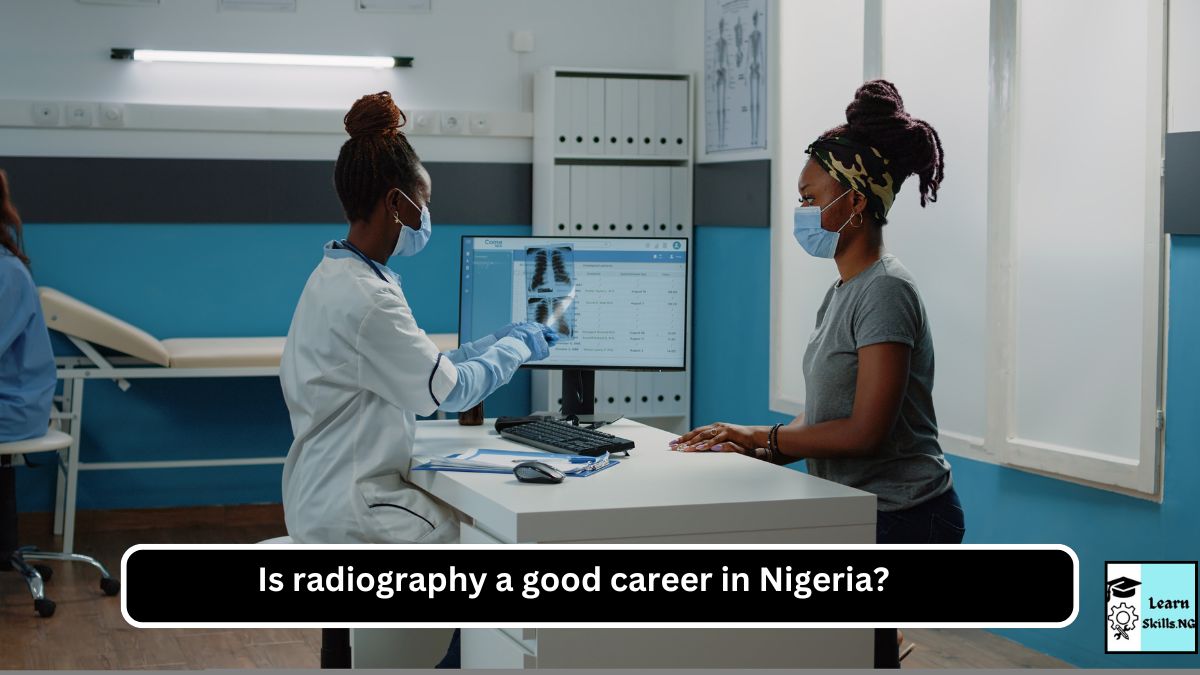Optometry offers various opportunities for growth and development, and it’s a rewarding choice of career in Nigeria.
In Nigeria, an optometrist’s average salary is ₦1,171,098 yearly, with a monthly pay of ₦159,167. This salary varies based on experience, location, and the sector where you practice, public or private.
Entry-level optometrists often earn less, about ₦92,000 monthly, while those with a few years of experience earn ₦112,000 monthly.
Salaries may increase significantly in larger cities or well-established clinics reflecting the demand for eye care services.
Overview of Optometry in Nigeria
In Nigeria, optometry is crucial in providing eye care services. An optometrist is a trained professional who examines, diagnoses, and treats vision problems. They help improve your eyesight and overall eye health.
Many people benefit from regular eye exams, which can catch issues early. Primary eye care programs aim to make these services accessible to all citizens.
Optometrists are found in private practices, hospitals, and community health centers. They often collaborate with other healthcare providers to ensure comprehensive care for patients. The salary of optometrists varies based on location and experience.
To give you a clearer picture, here’s a brief look at optometry salaries in Nigeria:
| Location | Average Salary (₦) |
|---|---|
| National Average | 1,100,000 |
| Abuja | 82,560 / month |
| Other Areas | 40,000 – 3,000,000 |
This overview highlights the importance of optometry in Nigeria’s healthcare landscape and how it contributes to better vision and eye health for all.
Education and Certification
You need specific education and certification to become an optometrist in Nigeria. This includes completing a Doctor of Optometry program, followed by additional requirements such as internships and registration.
Doctor of Optometry Programs
You must enroll in a Doctor of Optometry (O.D.) program offered by an accredited institution. This program lasts for at least five years and covers essential subjects like vision science, ocular health, and patient care.
Students often participate in hands-on training and clinical experiences to apply their knowledge. You will also complete an internship during the program, which is crucial for gaining practical skills.
After graduation, you may pursue a residency for specialized training in areas like pediatrics or geriatrics.
Nigerian College of Optometry
After earning your O.D. degree, you will need certification from the Nigerian College of Optometry (NCO). This ensures that you meet the professional standards required to practice.
Additionally, completing your National Youth Service Corps (NYSC) is mandatory. This service improves your skills and gives you the chance to work in various healthcare settings. Your career in optometry, working in clinics, hospitals, or private practices can begin once certified.
Professional Practice
In Nigeria, optometry offers various avenues for practice. Each setting can significantly impact your career, earnings, and professional experience.
Private Practice
In Nigeria, earnings in private practice can vary widely. Working in private practice allows you to create your own business. Many optometrists choose this path to have flexibility and control over their schedules.
- Monthly Earnings: Many optometrists earn around ₦90,000 monthly.
- Patient Base: Building a strong patient base is crucial for success.
Creating a welcoming environment and offering quality services can lead to a steady client influx. Continuing education can help you expand services and attract more patients.
Teaching Hospitals
Teaching hospitals provide a different experience for optometrists. Here, you can work with students and help train the next generation of professionals. This setting is often linked with better job benefits.
- Salaries: Salaries in teaching hospitals can be more stable, with averages reported around ₦107,000 monthly.
- Research Opportunities: You might also engage in research projects and clinical studies while contributing to education.
Working in this environment can enhance your skills and knowledge while giving you a sense of contribution to the community and the profession.
Eye Care Services in Facilities
Eye care services within various healthcare facilities represent another career choice. These settings include clinics, hospitals, and community health centers.
- Service Range: You will likely provide comprehensive eye exams, contact lens fittings, and management of eye diseases.
- Collaboration: Working alongside other health professionals allows for a more integrated approach to patient care.
This path can lead to a stable income. It often supports engaging, community-focused work that can be very fulfilling.
Salary Expectations
As an optometrist in Nigeria, your salary can vary based on experience, location, and the specific sector you work in.
Average Salary
Here’s a quick overview of salary ranges for optometrists in Nigeria:
- Entry-Level: ₦40,000 – ₦70,000 per month
- Mid-Career (5-9 years): ₦1,100,000 – ₦1,200,000 annually
- Experienced (10+ years): Average earnings can reach ₦3,000,000 annually
Monthly Salary by Location
In major cities like Abuja, the average salary for an optometrist is about ₦82,560 per month. Depending on your practice setting, this may vary:
| City | Average Monthly Salary |
|---|---|
| Abuja | ₦82,560 |
| Lagos | ₦107,000 |
| Other Areas | ₦40,000 – ₦70,000 |
Factors Affecting Salary
Several factors influence how much you can earn:
- Experience Level: More experience usually leads to higher pay.
- Location: Salaries tend to be higher in urban areas.
- Practice Type: Working in hospitals may offer different pay compared to private clinics.
Understanding these aspects can help you set realistic salary expectations in your optometry career in Nigeria.
Regulatory Bodies and Associations
In Nigeria, the practice of optometry is regulated by key organizations that set standards and support professionals in the field.
Nigerian Optometric Association (NOA)
The NOA is the main professional body representing optometrists. It advocates for quality eye care and the interests of practitioners. The association also organizes conferences and training programs to improve skills and knowledge.
Optometrists and Dispensing Opticians Registration Board of Nigeria (ODORBN)
This body is responsible for the registration and regulation of optometrists and dispensing opticians. It ensures that practitioners meet the required standards to practice legally in Nigeria.
Universities and Educational Institutions
Several universities in Nigeria offer programs in optometry. These institutions play a vital role in training future professionals. They work to ensure that graduates are qualified and meet the standards set by regulatory bodies.
Specializations within Optometry
Optometry offers several specializations that cater to specific vision needs. Two important areas are contact lenses and low vision care, both essential for improving patients’ quality of life.
Contact Lenses and Low Vision
Contact lenses are a popular option for vision correction. They come in various types. These include soft lenses, rigid gas-permeable lenses, and specialized designs for astigmatism or presbyopia.
Optometrists assess your needs, examine your eyes, and fit the right lenses to ensure comfort and clarity. Proper care and follow-up are crucial to avoid complications.
Low vision care focuses on helping those with significant vision loss. This specialization involves providing tools like magnifiers and adaptive technology to enhance remaining vision.
Optometrists work closely with patients to maximize their abilities and improve daily living activities. This approach emphasizes personalized solutions tailored to your unique situation.










